Alligator Sightings Are on the Rise—Beware of These Warning Signs, Experts Say
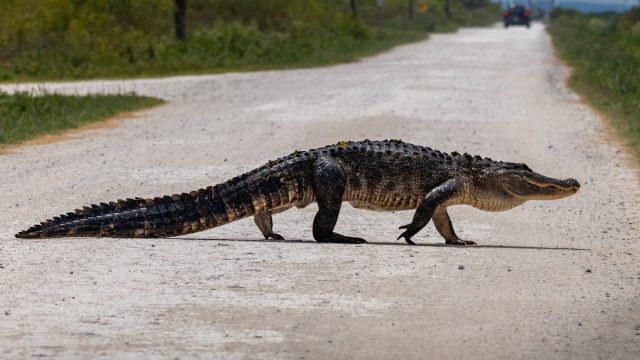
Every year, as temperatures rise, so too do reports of insect, arachnid, and snake sightings. And this year, another reptile keeps popping up in odd places—alligators. The scaly critters can seem cute or menacing depending on your feelings about them, but either way, the prehistoric predators are best admired from afar. But if a gator does get a little too close for comfort, there are certain warning signs you should watch out for. Keep reading to hear from experts about how to stay safe this alligator season.
READ THIS NEXT: It’s Snake Season Again—Here’s How to Spot and Avoid Them, Experts Say.
Alligators become more active in spring.
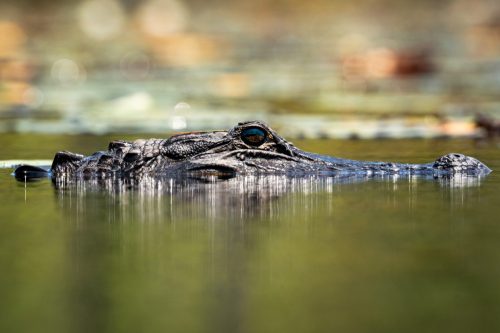
Alligators are ectothermic (“cold-blooded”) creatures and regulate their body temperature based on the temperature around them. According to the Florida Fish and Wildlife Conservation Commission (FWC), “When temperatures rise, their metabolism increases and they begin seeking prey.”
The FWC also explains that “courtship” begins in early April, with mating season occurring in May and June. Females will deposit their eggs in late June or early July, and they’ll hatch in mid-August through early September.
Therefore, residents of southern U.S. states can expect alligator sightings to rise. And as the FWC notes, they actually seek out sunny places, so don’t be surprised to spot these reptiles on roads, lawns, and swimming pools. They’re most active between dusk and dawn.
Reports—like a recent Newsweek story in which a 10-foot alligator was spotted strolling through a Naples, Florida country club—highlight this annual confluence of alligator energy. Sometimes, they’ll even overstep their boundaries a bit, like this Florida gator who knocked on a man’s door, then bit him.
Stay safe from alligators.
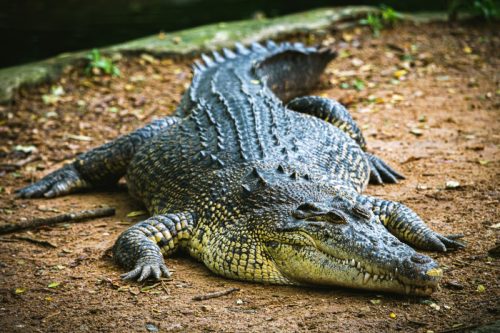
It’s scary to read reports of alligator attacks and pets being snapped up, but these reptiles rarely attack humans and would prefer to steer clear, as long as you remember a few simple things, including not ever feeding a gator.
According to the South Carolina Department of Natural Resources (SCDNR), not only is it illegal in most states to feed alligators, “but it also teaches them to associate people with food.”
“This can cause alligators to lose their natural fear of humans,” the SCDNR explains. “In many cases, fed alligators will begin to approach at the sight of people and may become aggressive in seeking a handout.”
Also, don’t toss fish or food scraps into the water when fishing (or ever). You might be feeding alligators by accident.
Of course, never approach an alligator, either, even if they’re tiny. And stay out of the water if there are alligators present.
If you have a pet, remember that small mammals are typical prey for gators. Keep pets away from the water if alligators are present, keep them on their leash near water, and generally keep an eye on them. According to the SCDNR, “If an alligator grabs your pet, let go of the leash.”
For more wildlife advice delivered straight to your inbox, sign up for our daily newsletter.
What if an alligator hisses at you?
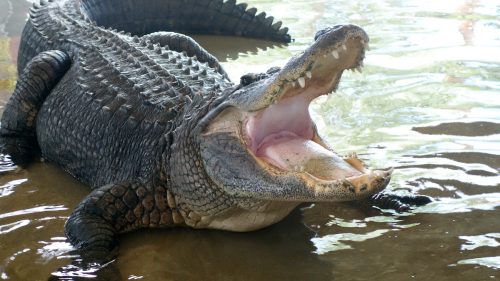
Alligators move fastest in the water, but if they’ve come on land, they can “run up to 35 miles per hour for short distances,” says Texas Parks and Wildlife (TPWD).
While they add that it’s extremely rare for wild alligators to chase people, if you do find yourself within a few yards of one, back away slowly. “Never make the mistake of thinking that an alligator is slow and lethargic. Alligators are extremely quick and agile and will defend themselves when cornered.”
And if an alligator hisses, “It’s a warning sign that you are too close,” TPWD adds.
Heed these other important warning signs.
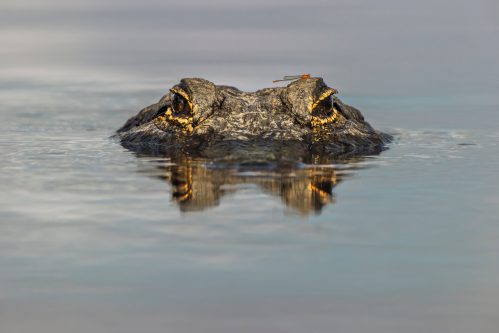
According to zoologist and animal trainer Jordan Schaul, in addition to hissing, other “defensive postures” of alligators include keeping their mouths agape or not retreating immediately into nearby water. These can mean that you are too close or that they are readying to attack.
If you live in an area where alligators are common, TPWD also advises people to be mindful of “piles of twigs, grasses and/or soil” near the edge of water. This may be a nest of alligator eggs, and if you approach it, the female gator “may charge.”
If you spot a gator somewhere it’s not supposed to be, if it doesn’t appear to have any way to get back to the water safely, or if it poses a hazard, such as in a schoolyard, contact your local natural resources or wildlife authority. “Never attempt to move an alligator by yourself,” the SCDNR cautions.